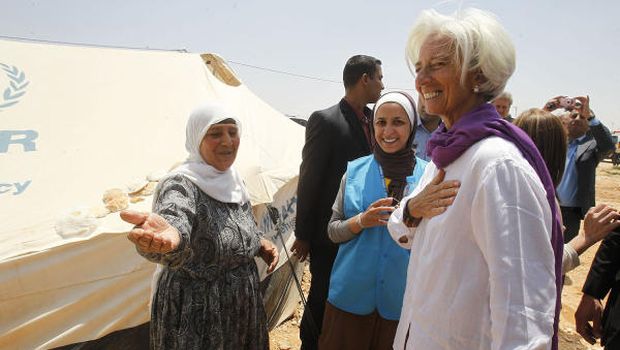
Christine Lagarde, managing director of the IMF, right, talks with a Syrian refugee woman during her visit to the Zaatari refugee camp in Mafraq, Jordan, on Sunday, May 11, 2014. (AP Photo/Ali Jarekji, Pool)
Amman, Asharq Al-Awsat—Arab countries currently transitioning to democracy need to adopt long-term economic policies if they are to bypass this transitional stage, IMF Managing Director Christine Lagarde said on Monday.
Speaking to Asharq Al-Awsat on the sidelines of an IMF-sponsored conference in Amman, Jordan, entitled ‘Building the Future’, Lagarde said: “You cannot be in transition forever, you have to eventually build into the future and what will be a long standing future, which is why the foundations of the economy are so important.”
Lagarde also called on Arab governments to enact major structural economic reforms and to open the way for greater private sector involvement in their economies. Responding to a question on how to stimulate growth, Lagarde said governments needed to continue to “focus on the foundations of the economy, that is the macro-economic framework, because when you have solid public finance you inspire confidence, you are predictable, people are prepared to invest, prepared to create jobs…and the more private sector there is…confident to invest, the more likely jobs will be created.”
Lagarde also stressed the need for Arab Spring countries—or what her organization calls “Arab Countries in Transition,” namely Egypt, Tunisia, Morocco, Libya and Yemen—to strengthen the middle class, as well as boost small- and medium-sized enterprises (SMEs), saying: “Our sense is that the middle should be strengthened, the middle of society being the middle class; the middle in economy means the SMEs, and the middle also means the medium-size states, the state that does not do everything” on its own and includes other stakeholders.
Lagarde had previously said Arab countries needed to be aiming for growth rates nearing 6 percent in order to benefit from any tangible development, again reiterating this at the conference on Monday.
In response to a question from Asharq Al-Awsat on current growth predictions, she said: “Ideally, the Arab Countries in Transition would have to double the current rate, so moving from 3 to 6 [percent]. Now, it doesn’t happen overnight and it will be gradual but I very much hope that it goes in that direction and that it reaches that 6 per cent number that would help to create the necessary jobs in the region.”
The current growth rates of Egypt, Morocco and Tunisia stand at 1, 2.5 and negative 0.3 percent, respectively.
Arab Spring countries that have managed to depose longtime rulers—Tunisia, Egypt, Libya and Yemen—have struggled economically since 2011. Tunisia and Egypt, previously major tourist destinations, have seen growth dwindle since their uprisings, with unemployment, inflation and debt all at dangerous levels. In a recent interview with Asharq Al-Awsat, Egypt’s trade, industry and investment Minister, Mounir Fakhry Abdel Nour, said his country’s total debt had now reached above 100 percent of GDP.
